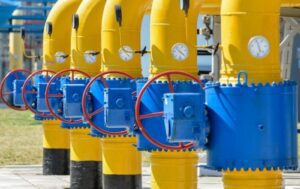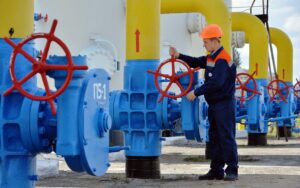
The German truck and bus manufacturer MAN was forced to send about 11,000 employees on unpaid leave due to the Russian military invasion of Ukraine.
The Volkswagen Group-owned company said on Wednesday that its facilities in Munich and Krakow, Poland, have been halted since March 14 due to the cessation of supplies of electrical wires produced at Ukrainian factories. At three other MAN sites, production volumes have been reduced, including at the engine plant in Nuremberg.
“Suppliers of electrical wiring for trucks cannot produce it at Ukrainian enterprises or can produce it in very limited quantities,” MAN said in a statement. “As a result, we could lose production for several weeks, which will sharply reduce output figures in the second quarter.”
The company said it has already started looking for additional sources of truck wiring harnesses in other countries.
“However, this will take several months,” said Alexander Vlaskamp, chief executive officer of MAN.
The company notes that its employees will be transferred to a reduced working hours scheme, in which MAN compensates them for 80% of lost income from both its own and state funds.
The problems of Ukrainian suppliers previously led to disruptions in the work of Volkswagen and BMW enterprises.
Most of the Ukrainian enterprises for the production of electrical wiring, located in the western part of the country, have resumed work, the Financial Times newspaper writes, citing representatives of several enterprises.
Thus, the German Leoni, which owns two factories in the west of Ukraine, has already reported that both of its enterprises have returned to work.
Other companies, including Aptiv and Kromberg & Schubert, have resumed production, FT sources say.
COMPONENTS, EUROPE, FACTORIES, MAN, MANUFACTURER, TRUCK, UKRAINE

Gas Transmission System Operator of Ukraine (GTSOU) has started accepting the first cargoes with technology and humanitarian aid from European colleagues, the company’s press service reported on Saturday.
According to the press service, the Belgian operator Fluxys provided equipment for centering during pipe welding, the Bulgarian Bulgartransgaz EAD – six tonnes of welding electrodes now in short supply in Ukraine for the repair of main pipelines, the German ONTRAS – humanitarian goods (mats, sleeping bags, etc.).
In addition, a scheme has been agreed with the German operator OGE (Open Grid Europe) for the emergency delivery of special equipment and repair kits for fireless tapping and connection of bypasses in case of damage.
Also, cargoes from six more GTS operators are already being formed for shipment.
In general, since the beginning of the Russian military aggression, GTSOU has received proposals for technical assistance from 15 GTS operators from 13 countries (Poland, Slovakia, Hungary, Lithuania, the Czech Republic, Germany, Belgium, Bulgaria, Greece, Spain, Italy, France, the UK).
“We are thankful to our international colleagues for the support, as well as the Ministry of Energy of Ukraine, USAID for assistance in obtaining critical materials. Thanks to all of you, GTSOU continues to supply gas to Ukrainian consumers,” the company said.
The length of the main gas pipelines managed by GTSOU is 33,079 km, the number of compressor stations is 57, and the number of gas distribution stations is 1,395.

Capacity utilization of Ukraine’s transit corridor on Friday remains at the same high level, in line with the long-term contract volumes of 40 billion cubic meters per year or 109 million cubic meters per day.
European buyers have increased nominations for Gazprom’s gas after prices soared due to the imposition of sanctions on Russia. Gas prices at the TTF hub were $1,383 per thousand cubic meters on Friday morning.
“Gazprom is supplying Russian gas for transit via Ukraine as scheduled in accordance with the requests of European consumers – 109.5 mcm on March 11,” the company’s official spokesperson Sergey Kupriyanov told reporters.
As confirmed by data from the Ukrainian GTS Operator, the nomination for March 11 is 109.4 mcm, while that for March 10 was also 109.4 mcm.

The spot price for gas in Europe continues to soar and is already 57% above Tuesday’s closing.
Prices for the nearest, April futures contracts at the TTF hub have broken the $2,000-mark, rising first to $2,011 and then an all-time high of $2,227 per thousand cubic meters on Wednesday afternoon, the previous high being $2,138 on December 21. These contracts closed Tuesday at $1,418, according to ICE Futures exchange data.
But that appears to have been the peak, with prices swinging down on news of a new short-term booking for Yamal-Europe pipeline capacity from 3:00 p.m. Moscow time until the end of the gas day. So far it looks like there will be an additional 0.8 million cubic meters per hour, which is 20% of the pipe’s capacity, in which case an additional 15 mcm of Gazprom gas will be delivered to Europe by morning.
The average TTF price on February was $935.
Apart from the Ukraine crisis, gas prices have risen in Europe due to an abrupt drop in temperatures this week and in wind power generation.

Spot prices for gas in Europe have topped $1350/1,000 cubic meters, their highest since early October, when prices surged to near an implausible $2,000/1,000 cubic meters. On Monday, the price of the closest (January) TTF futures on the ICE Futures exchange reached 116.395 euros per MWh, that is $1,358 per 1,000 cubic meters. In November, day-ahead contracts on the TTF traded at an average of $945, in December, at an average of $1,134/1,000 cubic meters. The average since the start of the year has reached $512.
Experts said that the latest spike in prices could be traced to a Sunday report by the Frankfurter Allgemeine Zeitung regarding the stance of Germany’s new foreign minister, Annalena Baerbock, on the Nord Stream 2 pipeline. The newspaper said that Baerbock, a representative of the Green Party, has always opposed the pipeline, but was compelled within coalition negotiations to accept the Social Democrats’ unwillingness to forgo the pipeline, which has already been completed. However, now that she has assumed the role of foreign minister, she is constantly being reminded about her previous stance.
The current level of gas reserves in European UGS facilities has already reached 62.83% of their maximum capacity as of Sunday morning, which is 17 percentage points below average figures over the past five years.
The European weather forecast for the current week envisages a new warming (much like in the same period of the previous year).
Wind generation in the past week (December 6 through December 12) accounted for 15.6% of the European energy balance after 18.5% in the preceding week (November 29 through December 5).

The Council of the European Union has added Argentina, Colombia, Namibia and Peru to the list of countries for which travel restrictions should be lifted. Ukraine also remained on the list of countries for whose residents the EU Council recommends gradually lifting travel restrictions at external borders.
“Following a review under the recommendation on the gradual lifting of the temporary restrictions on non-essential travel into the EU, the Council updated the list of countries, special administrative regions and other entities and territorial authorities for which travel restrictions should be lifted. In particular, Argentina, Colombia, Namibia and Peru were added to the list,” the EU Council said in a statement on the website on Friday.
As stipulated in the Council’s recommendation, this list will continue to be reviewed every two weeks and updated as appropriate.